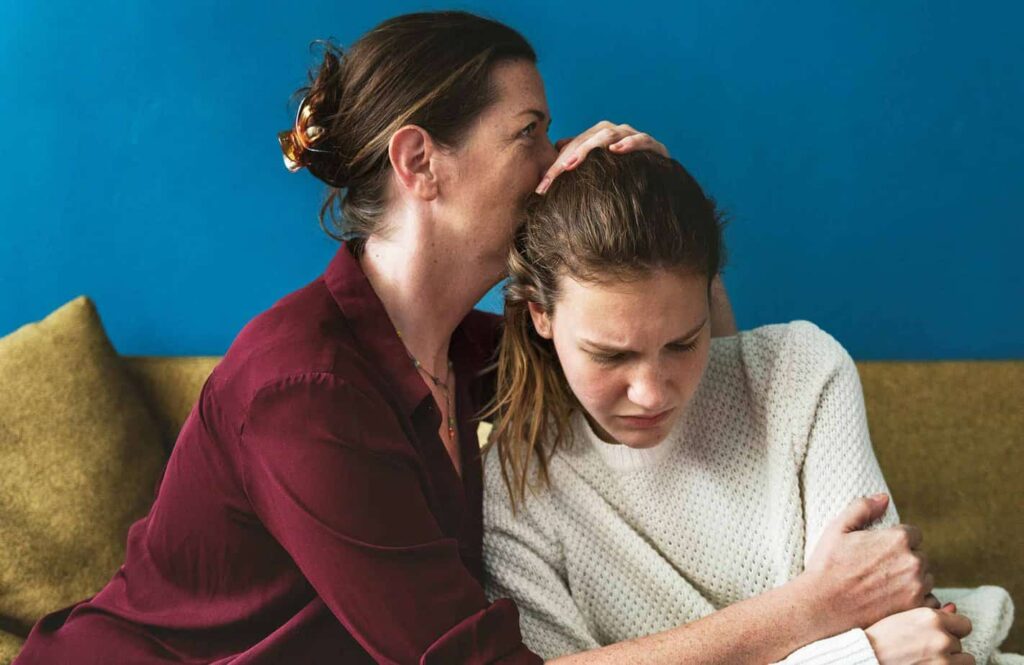Teen drug use often begins with small changes that are easy to miss. Your teen skips dinner. They seem tired more often. They get defensive when you ask simple questions. Families who come to Paradigm Treatment often say the same thing: We didn’t realize it was drug use until much later.
The signs of teen drug use rarely appear all at once. They build slowly, often blending into what seems like normal stress or growing independence. Recognizing those changes early makes a difference. Once patterns take hold, they’re harder to undo.
Key Highlights
- The earliest noticeable signs of teen drug use to parents are usually behavioral (withdrawal, secrecy, and irritability)
- Physical indicators, such as red eyes, disrupted sleep, or poor hygiene, often appear later, alongside behavioral changes.
- Substance use can become routine quickly and affect brain development during adolescence, so early recognition and prevention matter.
- Teens often use drugs to cope with emotional distress, not to rebel.
- Calm, consistent communication helps teens open up and accept help.
- Integrated treatment that addresses both mental health and substance use is most effective for recovery.
Quick Read
Teen drug use rarely looks dramatic in the beginning. It starts with changes in mood, energy, or behavior that seem like stress or growing independence. Recognizing early emotional and physical signs can help parents respond before casual use becomes a pattern. Understanding why teens use drugs (usually to escape pain or pressure) shifts the focus from punishment to support. If you discover your teen is using, stay calm, listen first, and reach out for professional help if needed.

What Are the First Signs of Drug Use in Teens?
The earliest signs of teen drug use are usually emotional and behavioral. You might notice your teen withdrawing from family, losing interest in things they once loved, or becoming unusually secretive. These aren’t just “teenage moods,” they might indicate that something deeper is occurring.
Isolation, in particular, is often the first thing parents notice. Your once-social teen may start spending more time alone, avoiding family gatherings, or locking their bedroom door more often. When you try to connect, they may seem irritable, emotionally flat, or just “off” in a way that’s hard to pinpoint. While one bad day isn’t cause for alarm, consistent changes in behavior are worth paying attention to.
Other Signs of Drug Use in Teens
Not every teen shows them (some go to great lengths to hide them), but you might notice a few of these physical indicators:
- Red or glassy eyes
- Dilated pupils
- Irregular sleep, e.g., staying up late, sleeping during the day
- Weight loss or gain without reason
- Less care with hygiene or appearance
- Ongoing fatigue or low energy
- Skipping school or falling behind in classes
According to the Centers for Disease Control and Prevention, 15% of high school students have tried illicit or injection drugs, and 14% have misused prescription opioids.
Recent data also shows that 1.86 million adolescents (about 7.2% of U.S. teens) used drugs in the past month, and 83.9% of those teens used marijuana during that same period.
These numbers show how easily experimentation turns into routine. Even when it starts small, consistent use affects attention, motivation, and mood, all things parents tend to notice first.
Why Teens Use Drugs
By the time they graduate high school, about one in three teens has tried an illicit substance. The number itself isn’t what matters; it’s that it represents how common it is for teens to turn to substances for relief.
Common reasons include:
- To ease anxiety, depression, or low self-esteem
- To feel accepted or avoid being left out
- To cope with family stress, trauma, or conflict
- Out of boredom or curiosity
Social media adds another layer. On platforms like TikTok and Snapchat, drug use is often shown as casual or funny, especially among influencers. For a teen who already feels anxious or disconnected, that kind of content normalizes the behavior.
From their point of view, the drug helps. It quiets their thoughts or lifts their mood. It becomes a quick fix for things they haven’t learned to name. Understanding why teens use drugs is what allows parents and professionals to help them find safer ways to cope.

What to Do When You Find Out Your Child Is Using Drugs
Finding out your teen is using drugs brings fear, frustration, and confusion all at once. It’s natural to react strongly, but that first reaction often sets the tone for what happens next.
Pause before responding. Take a few minutes to calm down and think about what you want to say. When you talk, aim for connection, not control. Avoid confrontation or rapid-fire questions. Start simply: “I’ve noticed some changes lately, and I’m worried about you.” Then let them talk.
The goal isn’t to catch them in a lie, but to understand what they’re feeling. Listening is often the hardest part, but it’s also what builds trust. Don’t shame or lecture. Keep the focus on their well-being and what’s driving the behavior.
You can still set limits. Be clear about expectations around safety and honesty, but deliver them calmly. Anger closes doors. Consistency keeps them open.
Creating Safe Conversations
The way you communicate matters as much as what you say. Choose a calm, private moment, such as after school, during a drive, or before bed. Avoid heavy talks in the middle of arguments or right after new discoveries.
Use clear, direct language. “I’ve noticed you seem really tired and quiet lately, and I’m worried” works better than “You’ve been acting strange, what’s going on?” Most importantly, focus on your concern, not on accusations.
If your teen denies using drugs, leave room for future talks. Pushing too hard rarely helps. Many teens need time to process before they’re ready to be honest. What matters is keeping the door open.
Teen Drug Use & Mental Health Treatment
Behavioral and emotional changes are often the first signs of teen drug use. They’re small at first, but over time, they add up. Recognizing them early gives families a better chance to respond with understanding rather than reaction.
At Paradigm Treatment, we provide a safe space for your teen to get treatment for co-occurring substance use and mental health concerns. Our approach treats substance use as a symptom of a deeper mental health condition. Every teen who enters our program receives a comprehensive psychiatric evaluation, which informs an individualized treatment plan built around their specific emotional and behavioral needs. Through daily one-on-one therapy, group sessions, and family counseling, teens gain insight into their behaviors and learn new ways to manage stress, triggers, and emotions without relying on substances.
Contact us today to learn more about how we can help.
Cited Sources
- Centers for Disease Control and Prevention (CDC). Substance Use Among Youth. Retrieved from https://www.cdc.gov/youth-behavior/risk-behaviors/substance-use-among-youth.html CDC
- NCDAS (DrugAbuseStatistics.org). Teen Drug Use Statistics and Trends. Retrieved from https://drugabusestatistics.org/teen-drug-use/ NCDAS





 November 5, 2025
November 5, 2025 Reading Time: 6m
Reading Time: 6m